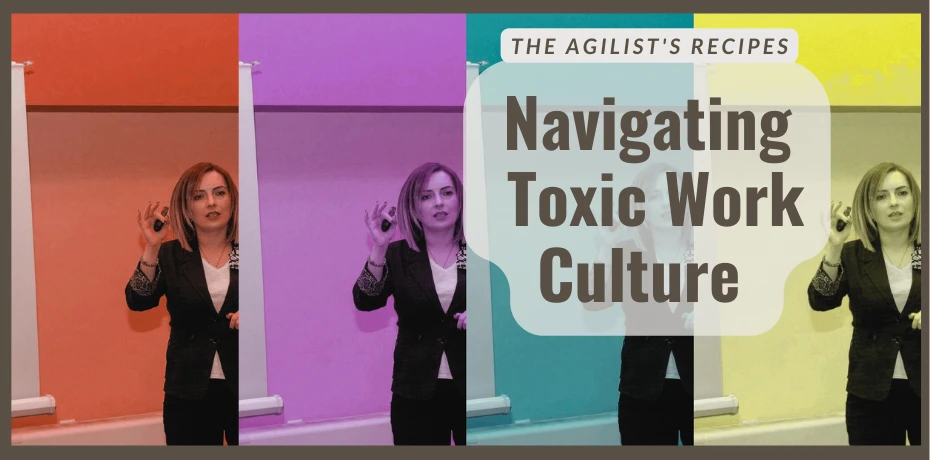A toxic work culture can be defined as a hostile environment created by problematic behaviors, interactions, and attitudes that adversely impact employees' well-being.
So what are the signs of a toxic culture?
Poor performance management
- You want a promotion? Here is your job description; you do it, and we will see how we promote you. We will ask your manager about their opinion. Other people are also chasing the same position, and we have to choose.
Instead of:
- We have observed progress on your side. Let's calibrate your skills and see where you are on your growth path. Reach your personal and team goals. You will get your deserved promotion based on a fair and transparent evaluation. Thank you for the great work!
Poor performance management practices such as micromanagement, unfair evaluations, and unclear expectations can lead to employees feeling undervalued and unmotivated. This can lead to high turnover rates.
Gossip and rumors
Those are pretty dangerous and contagious. When we say transparency, safety, justice, and trust, those could be the number one enemy of all those values.
Do not feed the beast.
Power struggles
The moment people start focusing more on:
- who said what
- who has a bigger influence
- whose decision is better
- whose position is firm
that completely changes the rules of the game.
All companies struggle with uncertainties. But what happens to the entrepreneurial spirit that we have in starting companies? They have more uncertainties than any other experienced one.
The thing that changes us with experience is our arrogance.
We get too confident and self-centric that we lose the abilities to:
- listen
- observe
- challenge ourselves
- constructively disagree
- find common grounds
- communicate without conditions
- empathize
- adapt
Lack of transparency and support
When there is a lack of communication, clear goals and objectives, it leads to a lack of direction and clarity. Employees can feel demotivated and unsure of their work and goals.
A lack of support from management can make employees feel undervalued and unimportant, leading to low morale.
Poor Leadership
Poor Leadership is one of the most significant factors contributing to a toxic culture. Leaders who micromanage, bully, discriminate, or favoritism can create a negative work environment.
Lack of accountability
A lack of accountability can lead to a lack of trust and respect among employees. It can lead to employees feeling undervalued and unimportant.
Unclear expectations
When expectations are not clearly defined, employees can feel confused and uncertain about their roles, responsibilities, and objectives. It can lead to frustration and low morale.
Limited growth opportunities
When growth opportunities are limited, employees can feel demotivated.
So if you want to change the toxic culture you are in, here are several tips that might help:
1. Do not start by changing how people think. That's time-consuming and hard to achieve. Remember, behavior is a function of the person and their environment.
2. If you happen to be in a situation where other people spread unfair rumors about you within your team, do not do one-on-ones to identify who said what; you will fail.
Simply suggest that topic at a retrospective meeting (or having an informal lunch together) or gather the whole team and express your bewilderment about what you have heard.
Thus you would
- Bring it to the open
- Ask a direct question in front of everyone
- Reduce Robin round
- Show the person and the others what happens when they behave like that.
- Recall the values on which we want to build our teams instead of identifying who said what.
After all, three main things matter
- Rumors create the basis for a toxic culture
- Healthy, happy cultures communicate openly
- If you want change to happen, start with yourself.
3. Try to evaluate how much time people use for talking and how much for actions. Understand what the major things people complain about are. The reasons might be poor communication, power struggles, negativity, abusive Leadership, or no clear vision/alignment.
4. Remind them why they are here, and give them a meaningful goal to focus on instead. Define clear actions and objective, transparent ways to follow up with daily, weekly, monthly, and quarterly results. You can start by creating team mission statements. Ensure you get all the necessary information about the business or product strategy.
5. Start leveraging the data you have. Use validated data instead of intuition and subjective decisions (well, sometimes our intuition saves us but remember, we want to switch the focus from destructive communication to goals and actions).
Keep all information in one place so that everyone can track the flow from request to customer satisfaction.
6. Do 360-degree evaluation, focusing on the team rather than individual performance.
Reward people for contribution, innovation, improvements, teamwork, co-creation and positive attitude.
7. Start initiatives like FedEx day: allow people to switch from current activities and focus on opportunities and new initiatives, and turn the best ones into actions.
8. Do not separate the Leadership from the set rules; make them lead by example and evaluate similarly.
When you free yourself from the unnecessary burden of proving who is right or wrong, you create an easy and enjoyable atmosphere for collaboration where miracles happen.
Do not be arrogant. Lead with simplicity.
9. Use individual coaching for those still bearing the old cultural habits.
Finally, Remember the great speech by Daniel Pink on motivation? People need Autonomy, Mastery, and Purpose.
Hope you found it helpful. :)

===
Whenever you're ready, there are 4 other ways I can help you:
1. Follow me on Linkedin to get daily tips on #agile, #team coaching, #scrum master growth, #agile leadership, #agilecoaching #culture
2. Join the waiting list for Ultimate Team Health Toolkit: a comprehensive collection of 20 exercises, templates and strategies to help measure and improve team performance and productivity.
3. Work with me 1:1 to grow in your Agile leader role or help your team and company grow.
4. Join the Agile Team Coaching Program: A targeted coaching- facilitation system to help Scrum Masters and Agile Leaders to identify team hidden obstacles and turn those into a growth plan in 30-60 days. Get on the waiting list!

